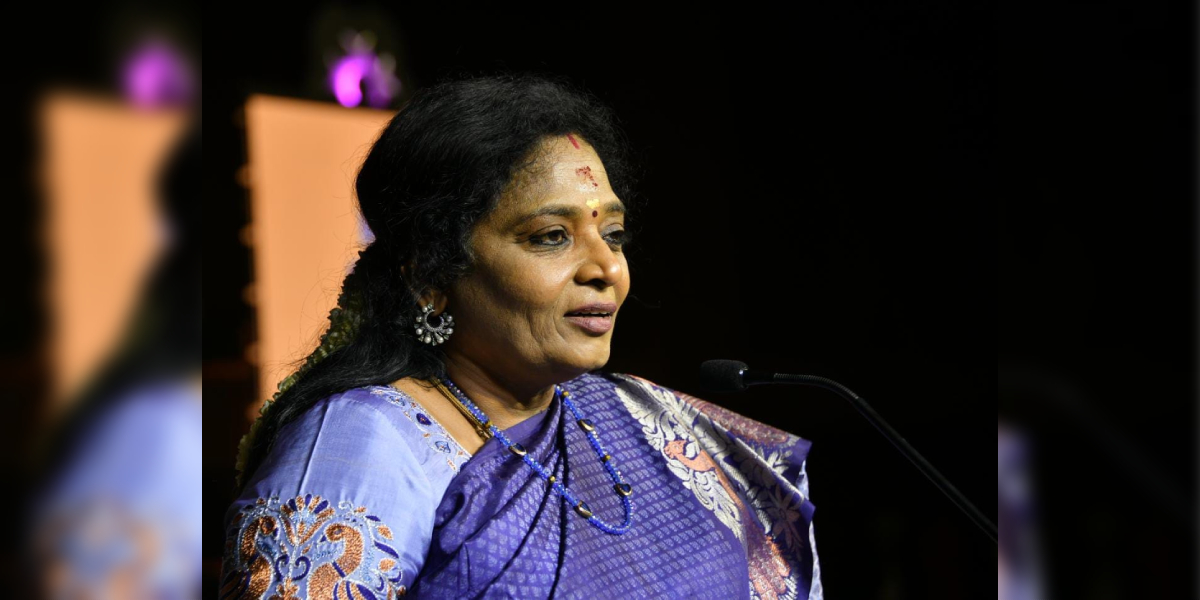Governor Soundararajan said the people of India are spiritually united and disapproved of efforts to divide them on regional lines.

Telangana Governor Tamilisai Soundararajan. (Supplied)
Telangana Governor Tamilisai Soundararajan on Friday, 8 December, said the northern states represent “gaumudra” (sacred symbol of cow) and not “gaumutra” (cow urine). She commented against the backdrop of a controversial statement made by a DMK Lok Sabha member in Parliament.
DMK member DNV Senthil Kumar on Tuesday, 5 December, triggered a row by making a controversial reference to Hindi heartland states in the wake of the BJP’s recent poll victory in Madhya Pradesh, Chhattisgarh, and Rajasthan.
The MP from Tamil Nadu made the controversial remark while taking part in a discussion in the Lok Sabha.
Soundararajan termed Kumar’s statement as “unfortunate”.
“I am from Tamil Nadu and I have to say this because it is very unfortunate that nowadays, the north-south divide is being mentioned by some of the people. And I felt very bad when a Member of Parliament from Tamil Nadu itself mentioned about northern states as ‘gaumutra’ states while differentiating them from southern states,” she said.
The Governor was speaking at a “Cultural Economy Conclave” organised by the India Think Council and the Gujarat University in Ahmedabad.
“I have to say that they (northern states) are ‘gaumudra’ states, not ‘gaumutra’. I am saying this because this divide should not be there,” she said.
“There should be respect. In ancient years, the people of Tamil Nadu used to keep a ‘hundiyal‘ (piggy bank) in front of God. They will put some money in it every day so that they can visit Kashi (present-day Varanasi in UP) at least once in their lifetime using that saved money,” said Soundararajan, who is also the Lieutenant Governor of Puducherry.
Governor Soundararajan said the people of India are spiritually united and disapproved of efforts to divide them on regional lines.
“How can you divide people? Spiritually people are not divided. Politically some people want to divide, but that can not happen because people of this country are spiritually united,” she said in her address to students and faculty members of the university.
In Tamil Nadu, people don’t mention Kashi and Rameshwaram (temple town in the southern state) separately.
People say Kashi-Rameshwaram, because whoever visits Kashi, they also come to Rameshwaram to complete their spiritual tour. And those who visit Rameshwaram, also go to Kashi, she maintained.
“North-south divide should not be deepened. Kashi is in the north and there is Tenkasi (a town in TN) in the south…I am again telling those who want to divide…you will not be successful because our culture unites us,” said the Telangana Governor.
Speaking on the need to have a strong cultural economy, she said though “More than 20,000 temples were destroyed in the last 100 years in the country”, such places of worship are now being developed.
Giving an example of the recently redeveloped temple of Shree Kalika Mata at Pavagadh Hill in Gujarat, she stressed the need to develop more temples to boost the local economy connected with them.
“Once you renovate a temple, it will draw more crowds. We need to focus on the renovation of temples. Before it was renovated, the Kalika Mata temple at Pavagadh used to draw 4,000 to 5,000 devotees every day. But today, after renovation, it draws nearly 80,000 devotees every day. So this is an example before us,” Soundararajan said.
Other suggestions mentioned by the Governor to boost the cultural economy included starting tours connecting cultural places and publishing books on various temples depicting their history and miracles associated with them.
“On the lines of Kisan (credit) Cards, we can issue Pilgrimage Cards for devotees so that they get concessions at a nearby hotel or get some preference in the puja. Such things can be done,” she said, adding that the management of prominent temples should think of opening reception desks to answer queries of devotees coming from other states.
(Disclaimer: The headline, subheads, and intro of this report along with the photos may have been reworked by South First. The rest of the content is from a syndicated feed, and has been edited for style.)

May 09, 2024

May 09, 2024

May 09, 2024

May 09, 2024

May 09, 2024

May 09, 2024